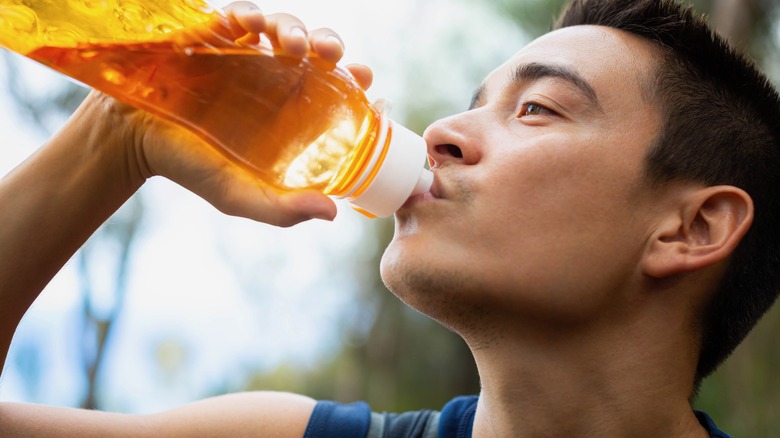What It Means When Exercise Makes You Gag
You associate many different things with working out hard: sore muscles, sweat, and heavy breathing. Nausea, gagging, and vomiting might not be something topping your list. But it happens more often than you think. A 2013 study in Przeglad Gastroentrologiczny Gastroenterology Review noted that gastrointestinal issues were shown in at least 20% of athletes, sometimes up to 70%. The study authors stated, "Gastrointestinal (GI) symptoms are common complaints reported by sportsmen." It was also most noticeable in those completing strenuous, long-lasting exercises like running and cycling.
Why do you gag and possibly vomit when hitting the blacktop for your run? A few common reasons include dehydration, a change in blood flow, lactic acid buildup, and low sodium. These changes in your body affect your GI tract differently, leading to gagging.
Since some of these conditions can have severe consequences if not treated, it's essential to know other signs to watch out for. We also dive into different prevention and treatment options to keep exercise-induced gagging at a minimum.
Dehydration can make you feel nauseous
You've just hit the gym and realized you left your water bottle at home. About 10 minutes in, you start gagging and feeling nauseous. The first place to look is at your hydration level. According to the Cleveland Clinic, dehydration happens when your body sweats out more fluids than it pulls in, leaving an imbalance of salts and water. So, you might be dehydrated because you're doing a strenuous workout without taking enough water breaks or didn't drink enough water before your workout.
The signs of dehydration include dry tongue, headache, dizziness, flushed skin, and gagging. Making sure to stay hydrated and supplementing electrolytes can keep nausea at bay. It's also important to drink before and after hitting the gym or going for your run, as well as hitting your drink during your exercise activity, per Healthline. However, avoid overfilling your stomach to keep from being sloshy, which can also contribute to nausea and gagging. Wear cool clothing when exercising during the summer months to prevent dehydration.
Gagging could be caused by blood flow changes
Your body makes remarkable changes when you lace up your shoes to hit the track or start pressing those weights at the gym. Skeletal Muscle Circulation (via National Library of Medicine) mentions exercise causes large increases in heart rate, depth of respiration, and cardiac contractility. Most of the blood also surges into the skeletal muscles to help you get in those laps or reps.
How much blood flows into your muscles depends on your workout's intensity level. High-intensity workouts require a lot of blood so that the muscles can push faster and harder. The blood surging in your muscles means less is available for areas like your digestive tract. The lower blood flow leads to digestive issues. Strenuous exercise and eating before working can exacerbate nausea and gagging.
Blood flow being diverted happens naturally, so it's not something you can stop when looking for relief from gagging. But you can avoid eating before working out since you know there isn't as much blood to process your food. It can also be helpful to take the intensity of your workout down a notch. The 2013 study showed that lower-intensity workouts can accelerate the emptying of the digestive tract.
Lactic acid buildup could be to blame
Whether you're new to exercise or have been in the game for a while, the term "lactic acid" has probably made its way into your ear a time or two. According to the Cleveland Clinic, lactic acid is a byproduct your body creates when it breaks down carbohydrates for fuel. During low-impact workouts, your body can easily filter out this byproduct through the liver and kidneys.
However, it's not as efficient when you're pushing yourself to the max, and lactic acid can build up. Chrissy Carroll, RRCA Running Coach at Snacking in Sneakers, explained to Verywell Fit (via Orthopedic & Sports Medicine Center of Oregon), "This is often termed "lactate threshold" for high-intensity aerobic activities (like running), but keep in mind lactate accumulation can also occur with strength training." When a person reaches their threshold, lactic acid accumulates, it can cause various symptoms, including muscle soreness and cramping. Too much lactic acid can turn your body acidic, called "lactic acidosis." This causes nausea, vomiting, exhaustion, and fatigue (per WebMD).
Lowering the intensity of your program and building up your max slowly can help to ensure lactic acidosis doesn't happen. For example, it might be helpful to add breaks into your workout, vary the intensity of your workouts, use less weight, or go shorter distances. If you experience lactic acidosis from exercising, once the lactic acid is purged, it starts functioning properly again.
Gagging can be due to exercise-associated hyponatremia
Building up your endurance in your exercise sessions takes you from a 30-minute training session to an hour one. For some athletes, endurance is the name of the game — specifically those training for a big event like a marathon. However, endurance training can have a side effect known as "exercise-associated hyponatremia."
This condition means that you have low sodium levels in the body. According to 2019 research in the Transactions of the American Clinical and Climatological Association, exercise-associated hyponatremia happens when the sodium concentration in blood plasma falls below 135 millimoles per liter during or after prolonged exercise. Risk factors for this condition include overhydration and nonsteroidal anti-inflammatory drugs. Common symptoms of hyponatremia are vomiting, headache, confusion, nausea, and restlessness (per Medical News Today).
Hyponatremia needs to be treated or it can lead to complications, including death, according to Healthline. IV fluids can be given to help get your sodium levels back to normal levels. Providers might also look for underlying conditions that can make an athlete more likely to develop this condition. In addition to drinking the appropriate amount of water, endurance athletes should consider beverages with electrolytes to replenish their systems.





